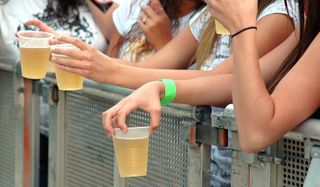Anxiety, Not Social Phobia, Spurs Teens to Drink More, Study Shows

A new study in the journal Alcohol and Alcoholism highlights the complex relationship between mental health and substance use.
Although it was known that anxious teens often self-medicate with alcohol, a group of Finnish researchers, led by Sari Fröjd at the University of Tampere, showed those teens are also more likely to continue using alcohol two years later.
Fröjd found that 65 percent of teens with anxiety who reported drinking weekly at the study's start continued to drink weekly two years later, whereas 55 percent of those without general anxiety disorder continued drinking that often.
The study shows that "general anxiety certainly exacerbates drinking frequency," Fröjd said.
Mental health conditions can increase or decrease drinking
Fröjd's study included 903 boys and 1,167 girls between the ages of 15 and 16 in an ongoing study known as the Adolescent Mental Health Cohort. She followed up with the teens two years later.
"We chose a two-year follow-up because adolescent development is quite rapid," Frojd said. "Changes in mental health can occur quickly during this time."
Sign up for the Live Science daily newsletter now
Get the world’s most fascinating discoveries delivered straight to your inbox.
The researchers assessed the teens' drinking frequency, frequency of drunkenness and marijuana use with a questionnaire. Some questions were also included from diagnostic tests designed to assess whether the teens suffered from general anxiety or social phobia an irrational fear of being judged or embarrassed in situations where others are present, such as a party.
At the study's start, 10 percent of the teens reported weekly drinking, 3 percent reported becoming drunk weekly and 3 percent smoked marijuana weekly.
Based on the teens' answers and criteria for mental health conditions , the researchers concluded that 4 percent of teens suffered from general anxiety, and 9 percent were sociophobic.
After controlling for gender, family structure, parent education and depression, Frojd found that there was pronounced relationship between drinking frequency and anxiety and social phobia.
Anxiety was associated with an almost three-fold increase in risk for becoming a frequent drinker after two years, the study showed.
The researchers were surprised to see that social phobia produced an opposite effect, Fröjd said.
Among teens with social phobia, 53 percent had continued to drink weekly, whereas 57 percent of teens without the condition had.
"We thought adolescents would use alcohol to feel better in social situations, but to get alcohol underage you have to interact with others, and that may be too difficult if you suffer from social phobia," Fröjd said.
This may change, however, when individuals are no longer underage, Fröjd said.
Family environment and genetics are also important
Anxiety is known to precede substance use , but it is less clear if this is a more significant risk factor than genes or social and cultural factors. Scientists at the University of North Carolina at Chapel Hill looked at the influence of social contexts on drinking in a 2008 study in the journal Child Development. Using information from more than 6,000 children, they found that factors such as family environment and peer relationships greatly affect how teens view alcohol, and whether they will begin drinking.
Genetics also play a role. In a 2009 review article in the journal Addiction, British researchers noted the influence of genetics on not only alcoholism but also conditions such as depression and anxiety that often occur in conjunction with it. For example, genes controlling dopamine and serotonin function play a role in both addiction and anxiety disorders, the researchers said.
"If I had to make an educated guess, I would say that parental alcoholism is most likely a stronger determinant of alcohol use than anxiety," Fröjd told MyHealthNewsDaily.
Fröjd and her colleagues plan to do a 10-year follow-up with the teens in the study to gain a better understanding of how mental health as an adolescent influences long-term substance use. For now, they said they hope school health officials and pediatricians use this information to help adolescents when problems first appear.
"If symptoms of anxiety are present, it's useful to ask if a teen has found alcohol helpful," Fröjd said. "This is an opportunity to talk about the hazards of using alcohol before a habit develops."
Pass it on: Teens with generalized anxiety disorder may be more likely to drink frequently than teens without the condition, but teens who suffer from social phobia may be less likely to drink frequently than others.
- In US, 1 in 5 Teens Have Serious Mental Disorder
- 10 Medical Myths that Just Won't Go Away
- 10 New Ways to Eat Well
Follow MyHealthNewsDaily on Twitter @MyHealth_MHND.
Most Popular



